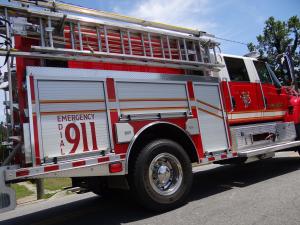By: Dan Menken
Today, in United States v. White, the Fourth Circuit affirmed the conviction of Michael L. White for conspiracy to commit arson and mail fraud; aiding and abetting arson; and accessory after the facto arson. On appeal, White raised two challenges to the sufficiency of the evidence. First, White argued that the government failed to establish the nexus to interstate commerce required to sustain the arson-related convictions. Second, he claimed that the evidence was insufficient to establish that he assisted a co-conspirator in evading apprehension and punishment as required for accessory-after-the-fact conviction. Additionally, White challenged his sentence, arguing that the district court used an inflated base offense level as a result of the court’s erroneous determination that the duplex qualified as a “dwelling” under the United States Sentencing Guidelines Manual. Each of these arguments was rejected by the Court.
Defendant Accused of Burning Duplex to Recover Insurance Proceeds
White, who was struggling financially, had become increasingly irritated that the tenants of his duplex were not paying their rent. In June 2009, White purchased a fire-insurance policy to cover the duplex “as a two-family tenant-occupied” rental property. The policy provided $80,000 coverage for the duplex and $20,000 for its contents. Later that summer he offered $4,000 to his neighbors, Doug and Kim Kinder, to burn down the property. The Kinders agreed and set fire to the property on October 16, 2009.
In June 2010, Kim Kinder was contacted by the West Virginia State Police. She confessed to her involvement in the arson and agreed to cooperate with the police. Kinder made a recorded telephone call to White, in which White did not deny his involvement in the arson. When White was subsequently interviewed by police, he stated that Kinder had confessed to having started the fire. Testifying at trial, White denied knowledge of or involvement in the burning of the duplex.
Was There Sufficient Evidence to Establish the Interstate Commerce Element?
Under 18 U.S.C. § 844(i), it is unlawful to “maliciously damage[ ] or destroy[ ], or attempt[ ] to damage or destroy, by means of fire or an explosive, any building, vehicle, or other real or personal property used in interstate or foreign commerce or in any activity affecting interstate or foreign commerce.” In Russell v. United States (1985), the Supreme Court held that the arson of a two-unit apartment building that was used as rental property fell within the purview of 18 U.S.C. § 844(i). In that case, the Court concluded that the property was “being used in an activity affecting commerce” because the apartments in the building were rented to tenants at the time of the fire.
White’s appeal raised the issue of whether a rental house can still be classified as an activity affecting commerce if the tenants vacated before the fire was set. In United States v. Parsons (1993), the Fourth Circuit concluded that a rental property qualified as being involved in interstate commerce despite being vacant for two months at the time of the fire. There, the Court determined that there was sufficient evidence that the house was a rental property at the time of the fire because (1) the house was insured as rental property at the time of the fire, and (2) having found that the defendant commissioned the fire, the jury could also have reasonably inferred that the defendant never intended to take the house of the rental market.
Thus, applying Parsons, the Fourth Circuit concluded that there was sufficient evidence to support the conclusion that the duplex was being used in interstate commerce.
Was There Sufficient Evidence to Support a Conviction for Accessory After the Fact to Arson?
In order to prove accessory after the fact under 18 U.S.C. § 3, the government must demonstrate “(1) the commission of an underlying offense against the United States; (2) the defendant’s knowledge of that offense; and (3) assistance by the defendant in order to prevent the apprehension, trial, or punishment of the offender.” The government charged that this occurred when he knowingly made a false and misleading statement to an insurance representative for the purpose of helping Kinder and himself avoid apprehension. White contended that his statement to the insurance agent was nothing more than a passing comment to an insurance representative who was not connected to law enforcement.
All the evidence must show is that White acted “in order to prevent the apprehension” of Kinder and himself. The Fourth Circuit held that the only logical purpose for White to attempt misdirection in his interview with the insurance agent was to ensure the Kinder would not fall under police scrutiny.
Was the Duplex a “Dwelling” for Sentencing Purposes?
White argued that the duplex was no longer a “dwelling” at the time of the fire because it was vacant. A “dwelling” is a “house or other structure in which a person or persons live,” including “the apartment or building . . . occupied by a family as a place of residence.” The Court pointed out that there was no indication that the duplex had ever functioned or would ever function as anything other than a dwelling. The fact that the duplex still had power and was in habitable condition pointed to the fact that it should be considered a “dwelling.”
Dissent: Cannot Be Both Principal and Accessory After the Fact
The dissenting Judge argued that the law does not allow White to be both responsible as a principal for the arson and also as an accessory by assisting himself and Kinder after the fact. Although Defendant did not preserve this error, the Judge believed that this issue cleared any plain error hurdle.

